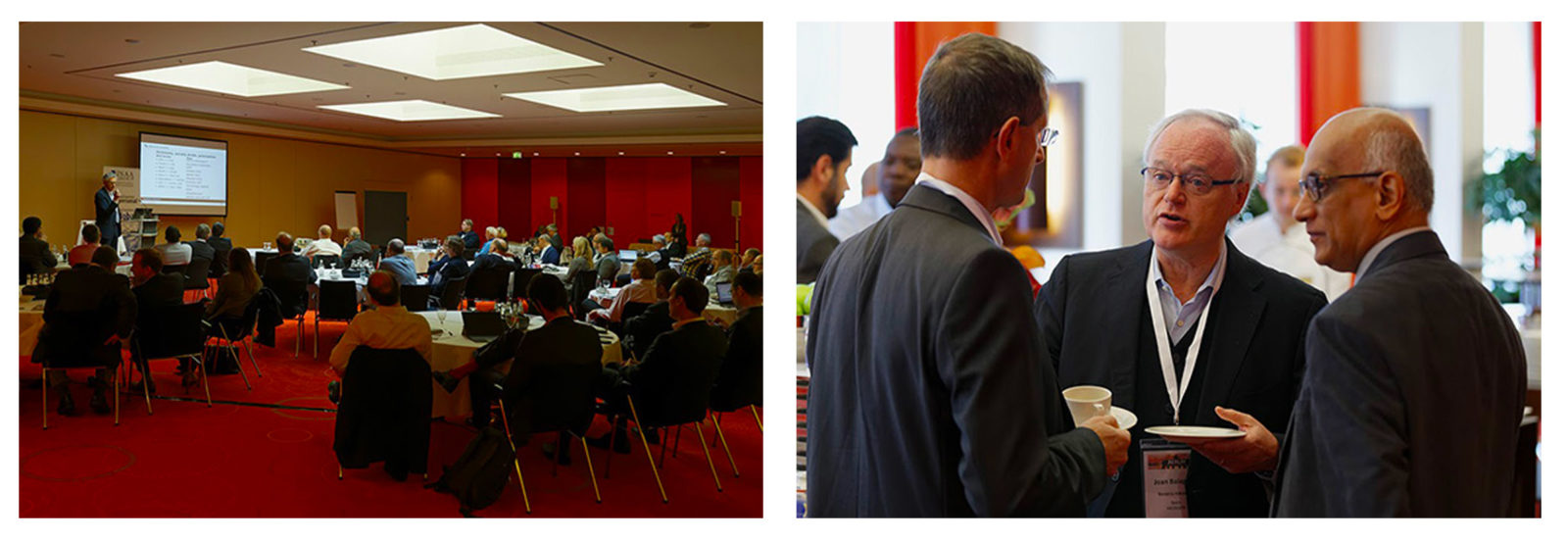
Not less than 65 delegates and 20 guests attented our latest AGM in Berlin on 3-4 November, which makes it a great success !
Shariq Contractor kicked off the day with a general presentation about INAA to inform our new...
Shariq Contractor kicked off the day with a general presentation about INAA to inform our new, future and potential members present. This was followed by Doing Business in Uk and Canada presentations.
The programme committee had worked on a very interesting programme. See below a summary of the presentations:
Development of the German audit profession - Structures and Challenges
Dirc Fröschen (in lieu of WP Heiko Span), Wirtschaftsprüferkammer German Chamber of Public Accountants
Mr. Fröschen started by stating the key facts of the German market for audit and related services in 2015. The market for audit and assurance services, legal, tax and business advice is estimated to be worth 12.2 billion euros and is expected to grow by 3% in 2016.
He highlighted how for the first time since the German profession was established in 1931, the number of auditors and audit firms has declined in 2015 to a total of 21,325 auditors and firms. Applicants for the Professional Examination enabling them to carry out statutory audits and provision of tax advisory services in Germany has also fallen year on year.
Mr. Fröschen went on to discuss the German Oversight System, The German Chamber of Public Accountants (Wirtschaftsprüferkammer). A self-governed body which elects the Chamber’s boards and panels by industry professionals and membership is mandatory for all German auditors and audit firms.
The main tasks undertaken by the Chamber, outlined by Mr. Fröschen were:
- Disciplinary Oversight on NON-PIE auditors (PIE auditors insofar as NON-PIE clients concerned)
- External Quality Assurance System
- Development and updating of Professional Charter
- Maintaining a public register of auditors: licensing / registration and revocation of auditors and audit firms
- Administration of professional auditor examination and aptitude test
- Providing advice and services to its members
Lastly, Mr. Fröschen discussed the national and international challenges faced by the German audit profession. The EU-Audit Reform as reaction to (alleged) failure of the audit profession during the financial crisis. To avoid future auditor failures, he suggested, increasing audit quality, strengthening auditor independence and boosting competition (marketpower of BIG4 firms).
He concluded by setting out future industry challenges that must be overcome, such as finding a way to repair professional reputations following on from the financial crisis and scandals, keeping up with the speed of ‘digitalisation’, IFAC-developments.
Download the presentation here
Role of local accounting firm in cross border transactions
Carsten Beissel, Director Finance/Controlling, Voss Automotive
Mr. Beissel spoke largely about the ‘Big 4’. He described how his first-hand experience working with different countries enabled him to witness how the ‘Big 4’ operate, and more importantly their shortcomings on a local scale.
He said, “[The] Big 4 are too sophisticated, too far away from daily business. With INAA members, this is different, more down to earth,” consultants from these big multinationals do not guide the client in the same way INAA members can. He concluded by stressing the importance of local expertise on the economic climate in each country and how a sense of entrepreneurship is key to success for SME’s.
Download the presentation here
The economic and social outlook
Prof Hans Kasper, Professor of Marketing, Maastricht University School of Business and Economics & Scientific Director, Etil
Hans Kasper (1952) is professor of Marketing and Market research at the School of Business and Economics, Maastricht University. He is also the Scientific Director of Etil, a Maastricht-based policy research institute on regional economics. Alongside that, he recently founded Silverbrains bv, a consultancy and research company focusing on consumer behaviour of the older consumers.
The key themes discussed in Professor Kasper’s presentation were the uncertain future for Europe and globally given Brexit, Migration and the Quantative Easing policy introduced by Central Banks.
He described Quantative Easing as a massive expansion of the open market operations of a central bank. The central bank buys securities from its (national) member banks to add liquidity to capital markets. In return, it issues credit to the banks’ reserves to buy the securities (80 billion euros a month). Central banks create the credit to buy these assets out of thin air (“administrative book keeping”) – this equates to printing money, lowering interest rates and spurring economic growth.
Professor Kasper goes on to broach the subject of Brexit. Since the referendum, the Pound has fallen by 20%, making imports more expensive and exports cheaper. The situation remains uncertain, with no clear exit strategy in place or decision on whether the UK will leave or remain in the internal market.
He concludes by discussing globalisation, how people’s socio-economic position affects their views on globalisation, a graph shows how people from advanced economies have more negative attitudes towards globalisation compared to those from developing economies.
Download the presentation here
Shi(f)t happens: how to survive turbulent times through data-driven advisory
Menno Kooreman – Unit manager SRA-ICT
Marc Johnston – Project Manager SRA-BiZ
Two speakers from SRA led a two-hour presentation on the future of data within the accountancy industry. They discussed mega trends, with a specific focus on technological developments (e.g. Big Data, Cloud computing, Blockchain, Consumerisation & Digitalisation). Inevitably, these trends (will) have a major impact on people and businesses, including the SME Accountancy firms.
They present a clear-cut argument for transitioning from a traditional accountancy firm into a modern, data-driven advisory firm through their online benchmarking platform. The platform already contains 100.000+ financial statements from over 600 lines of businesses.
They conclude by outlining an optimistic view for a sustainable future amid the current uncertain economic landscape, questioning, “when will the ‘Uber Accountants’ enter the stage?”
Download the presentation here : Part 1 - Part 2
Digital data analysis – A question of a specific software?
Andreas Muller, DATEV
Mr. Muller explained the flaws and pitfalls when companies are buying software; often sales people will paint an idealistic picture of the product, pitch it quickly with little detail to get a fast decision, and focus on ‘quick wins’. However, he goes on to present the importance of implementing effective data analysis for annual audits through selecting the correct software and training staff in how to use it, defining targets and developing a plan, plus monitoring the data analysis periodically.
Download the presentation here
